Chocolate

Chocolate poisoning is the most commonly reported poisoning in dogs. There is an ingredient in chocolate that is toxic to dogs called theobromine (a bit like caffeine).
As a general rule dark high quality chocolate contains the most, but it is also contained in milk chocolate. Fatalities have been seen in dogs eating as little as 60g milk chocolate per kilo bodyweight. White chocolate is unlikely to cause theobromine poisoning, but the high levels of fat and sugar can still be harmful to dogs and should be avoided.
Theobromine mainly affects the guts, heart, central nervous system, and kidneys, and signs of theobromine poisoning will occur between four and 24 hours after your dog has eaten chocolate. You may see vomiting, diarrhoea, restlessness, hyperactivity and seizures
If you think your pet has eaten chocolate contact a vet immediately.
If possible give an idea of how much has been eaten and take along the wrapper.
Caffeine
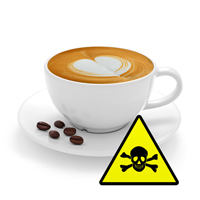
Like chocolate, caffeine is a stimulant. Dogs are more sensitive to the effects of caffeine than people. A couple of laps of tea or coffee are unlikely to do any harm, but if your dog swallows a handful of coffee beans or tea bags they could be in danger. Signs and treatment of caffeine poisoning are similar to chocolate toxicity.
Alcohol

Alcohol is more toxic to dogs than to humans. Even small quantities of alcoholic drinks and food products may cause vomiting, diarrhoea, decreased coordination, central nervous system depression, difficulty breathing, tremors, blood changes, coma and even death. So, remember to keep alcohol well out of your dog’s reach.
Macadamia Nuts
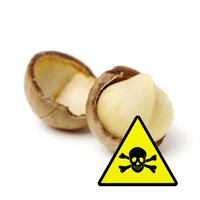
Macadamia nuts can cause dogs to experience weakness, depression, tremors, vomiting and increased body temperature. Symptoms tend to appear within 12 hours and can last for approximately 12 to 48 hours. If you suspect your dog has consumed macadamia nuts note the possible quantity consumed and contact your vet.
Xylitol Artificial Sweetener
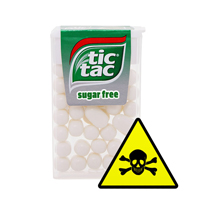
Xylitol is found in many foods including some sugar-free gums and sweets, diabetic cakes and diet/low sugar foods. It causes insulin release in many species (but not in humans) leading to potentially fatal hypoglycaemia (lowered sugar levels). Xylitol has also been linked to fatal acute liver disease and blood-clotting disorders in dogs.
Even small quantities can cause toxicity in dogs. Some sugar-free sweets and gums have very high amounts per piece. Early symptoms of xylitol poisoning include lethargy, vomiting and loss of coordination. Seizures may also occur.
If you think your dog has eaten any xylitol seek urgent veterinary advice.
Grapes & Raisins
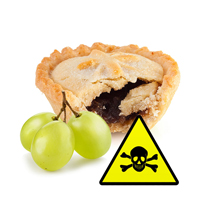
Any quantity of grapes and raisins can be toxic to dogs and experts agree there is no safe quantity that dogs can eat. The toxic substance in grapes and raisins is unknown, but it can cause kidney failure in sensitive individuals. Dogs with underlying health conditions are at greatest risk and just one raisin can be severely toxic.
Cooking or baking doesn’t reduce the risk of poisoning so keep fruit cake, mince pies, fruit scones and hot cross buns out of reach.
Poisoning may initially result in vomiting and diarrhoea and subsequently in kidney failure (which may occur a few days after the initial effects).
Mouldy Food
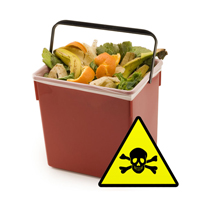
Always dispose of leftover food carefully and take care that dogs can’t access your food waste bin. Mouldy food, including bread, nuts and dairy products can be highly toxic for dogs and can make them very ill, and can even be fatal.
Onions and Garlic
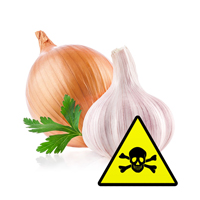
Stomach and gut irritation, red blood cell damage and anaemia can result from eating any form of onions or garlic, including dehydrated onions, raw onions, cooked onions and table scraps containing cooked onions or garlic. Onions are particularly toxic and signs of poisoning often only occur a few days after your dog has eaten the vegetable.
Please be aware that lots of prepared foods may contain onion or garlic and can cause illness in dogs e.g. left-over pizza, takeaways, sauces and gravies contain onion or garlic powder.
Yeast Dough
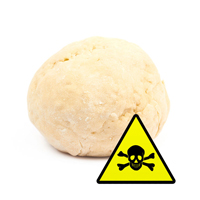
If yeast dough is eaten by dogs it can cause gas accumulation in their digestive system as a result of the dough rising. This can be painful but it may also cause the stomach or intestines to become blocked.
Blue Cheese
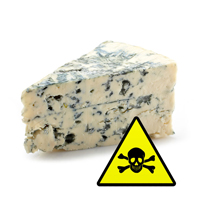
Cheese contains enzymes that dogs have difficulty breaking down and eating large quantities can cause sickness and diarrhoea.
However, blue cheeses are particularly dangerous as many contain roquefortine C, which dogs are especially sensitive to. This can cause vomiting and diarrhoea and tremors, twitching, seizures and high temperature if eaten in large doses. Seek emergency veterinary advice if you think your dog has eaten blue cheese.
Bones

In the past giving a dog a bone was considered to be a good idea but they are have many potential risks. Dogs may choke on them, develop intestinal obstructions after swallowing pieces of bone, damage their teeth chewing them, or sustain internal injury as bone splinters can puncture your dog’s digestive tract.
If you do decide to give your dog a bone be sure to keep an eye on him while he tucks in and always avoid giving cooked bones, which splinter more easily, or small bones that could get stuck in their intestines. Large quantities of bone can often cause constipation, so try to monitor the amount your dog manages to eat.
Corn on the Cob

Dogs struggle to digest corn on the cob. If a whole cob is eaten, or even large chunks, it can cause an intestinal blockage due to its size and shape. Signs to look out for are vomiting, loss of appetite or reduced appetite, absence of faeces or diarrhoea and abdominal discomfort.